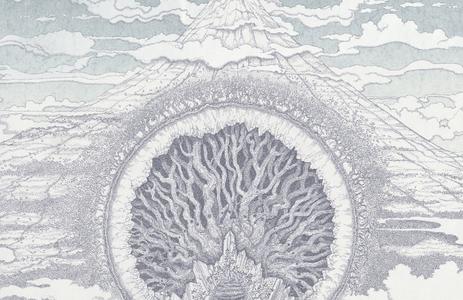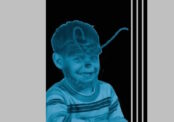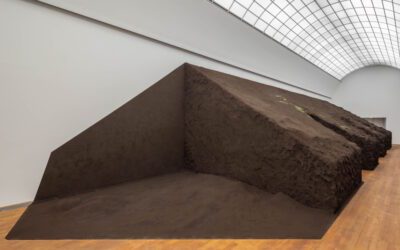[dropcap style=”font-size:100px; color:#992211;”]R[/dropcap]andall Dunn, the Rick Rubin of Contemporary Doom, has a resume that contains a who’s alive of heavy music.
Sunn O))), Wolves in the Throne Room, Grails, Earth, the list goes on. His most personal creation is the group Master Musicians of Bukkake, a rambling collective of musicians that blend esoteric mysticism, arch comedy, and superior musical arrangements. It’s a heady mix on all levels that contains the wildness and danger of real art within something quite accessible that rewards both in the long and short term.
Released in June 2013 Far West is their ninth release since 2004 and in Skype-calling a Seattle mobile Trebuchet gets into his approach to music making and the story behind the incredible artwork for Far West.
Randall Dunn: I gave Simon (Fowler) the brief around three years ago. I wanted Far West to have a strong conceptual theme as far as the artwork goes – we really left it up to the artist to translate it and turn into what Simon did. Which is absolutely incredible and exceeding anything that I could have hoped for.
But I gave him the references and topics that we’d cover in the album itself.
Trebuchet: Was the concept behind Far West a story?
RD: It all kinda fits together. There’s a lot going on in the record itself. On the record cover I wanted to pose the idea of exoticism. So making it look like an old Japanese print and embrace all that but also make it look like a Yes record. So we managed to pay homage to prog in a way as well.
The actual mountain on the album sleeve is modelled on a mountain near us in Seattle called Mt. Shasta which is a hotbed for new age beliefs and also has some similarity to Mt Fuji. Also I think the cover shows some of my interest in Zen Buddhism – having an organ that is in the heart of the mountain expresses a sort of heart metaphor. We’re trying to relate more of a direct emotionality than we’ve tried to do in the past.
MASTER MUSICIANS OF BUKKAKE from URSSS on Vimeo.
A lot of people think that we’re trying to be separate from the music or separate from people by wearing costumes and stuff. This record represents us finally getting to a point where we almost feeling like singer-songwriters! We’re getting older and trying to connect in a much more emotional way with music – a much more holistic approach than previous records.
Right, so for a band with a boldly silly name you seemed to have a made a very sincere record.
Neither of things are mutually exclusive.
For instance, there is a pure reverence for wanting to be influenced by some of things like world music, but then on this record there is a lot of normal folk rock. Trying to take it very seriously, but also not to make things that are culturally complicated and out of the realm of what we really know. We give homage to these things but never to be traditional or to take it out of the realm of a rock band which is really what we are.
I would never want to take it so far, into say Indian music, that we want to be on pedestal as Westerners. I think that is where a lot of world music sort of flips, it becomes such a broken fetishisation of itself.
[quote]human interaction
becomes replaced by
social media….We
see real freedom
replaced by fake
freedom[/quote]
Being a producer you’ve seen so many songwriting and producing techniques. Does this make it harder or easier to choose the way you make MMOB records?
The approach that we used is quite different than other musical projects that we’re involved in. As a producer the process with pop, rock or experimental bands is geared around a goal: ‘we have to get a record done’. So then the musicians have to work creatively within certain parameters to make that happen.
Which is still a useful tool in making music but when we started to think about how we wanted to do things for Master Musicians what we tried to keep out were any habits we might have in how music might be created, and how things could be created in layers, and not have boundaries on how far something could go, and be uncomfortable with something and allow things to not relate and then make them relate unexpectedly later on.
So we made it more of a lab in terms of ways that you can make a song happen. Extreme ways of using the studio that you can’t do live and in ways that you couldn’t do it if you just sat down and played.
Dreams and the album?
On the full artwork there is a Zen poem that I put there that shows this record is an homage to impermanence and an illusory existence. A sort of dream existence. As in: how much of what we think of as real at any given time is real and how much have we manufactured in order to prove that we’re real?
The whole record talks about evolving things, rebuilding things, creation and existence in a holistic way.
Do you still think we live in a ‘failed future’?
I think we’re in the future that we’ve created for ourselves. I think it’s a joke and if you don’t laugh at it then it’s pretty sad.
I think we live in a world where the concept of a future is a sort of response to a French writer I was reading called René Guénon. He makes a parallel of the breakdown of modern civilisation as a metaphor for the Hindu concept of the Kali Yurga, where all things become synthesised. So everything that we revere and our connection to the divine, or the mother, or nature, becomes replaced by a facsimile that we think is the real thing.
For instance, human interaction becomes replaced by social media. And that’s just one example of hundreds and everyone is perfectly fine (for the most part). We see real freedom replaced by fake freedom. So failed future is about people in the 50s looking at beautiful drawings of what they’d be living like in the 2000s. I always think ‘well you failed, you tried to do this thing, and you failed’.
But I don’t think that the world has become a horrible place. I think that we should be more aware of now rather than some idea of the future. This life is a like a really nice car that’s missing a tyre, nobody can see that it’s missing a tyre, but people keep driving it until it runs out of gas….
Is this the same theme as your totem series?
I’m starting to realise that our records are one continuous work. Far West is the flip side of that energy. I also think a lot of realisations have been made since then.
Such as?
Just ways of approaching our subjects that are much lighter. I think we’re more tuned into our Western gaze looking East, and that some of what Far West is about is looking inward rather than externally. I think we’ve explored topics and music that we haven’t necessarily explored before. Certainly ‘Circular Ruins’ and ‘The Dark Peace’ encapsulate this approach most fully, to some extent.
[quote]sometimes it’s the
values that make
things sound more
real not just
the equipment[/quote]
Moving to the Fontanelle record, what’s the secret to getting that warm thick 70s sound?
I just use 70s equipment! (laughs) There are a lot of things going on in that record anyway, but I think I’ve been lucky to work with artists that have an affinity for that sound. So that makes it much easier. The study of recording over the years and who I’ve learned from and the studio that I work in… I just try and use as much analogue gear as possible.
As well as a more organic approach to the creation of the music than I hear from a lot of artists these days. A lot of people are quantising their music and using a grid to dictate the feel of their music and using a lot of the same tools to create their music as everyone else.
Now I think that some of it is really great. But I think that there is a real void of people that are creating music in a much more organic sense, people not playing with the digital realm so much to try and make it perfect but allowing things to get out that gate once in a while, and sometimes it’s the values that make things sound more real, not just the equipment.
Complete takes versus track segments?
For sure. I always push bands to outline things with a complete take, at least on the a basic track. You can augment that with overdubs but the more parts you replace the more, something is taken away from the whole. I’m not against doing anything with digital, I think there is a strong viability to that. Certainly with Master Musicians and other bands there is a strong use of collision between digital and analogue. Neither one of them is necessarily better, it’s just a different approach.
The record I’m working on now is probably one of my favourite things I’ve ever worked on. It’s a companion record to the last Wolves in the Throne Room record – It’s the three of them and they’re embracing their inner Vangelis. It’s pretty epic and I’m really excited about it.
I can’t talk about it too much. It’s a really beautiful record and probably not what people are going to expect at all. They’re really really inspiring guys the way they’ve structured their lifestyle with music and the way they’ve managed to create a community… it’s pretty inspiring.
Their stage show used to include a lot of ritualistic elements but they seem to have moved away from that.
I think it’s always there and is there in a psychic capacity in their new stuff and it’s definitely there in their life. To the extent that maybe it’s more in their life than on stage – but you’d have to ask them.
Is there a pinnacle of what you want to achieve with music?
God. I don’t know. I think I’m just trying to make each situation as great as possible as it can be with the people that are involved. I don’t ever feel like I’m striving for that one… otherwise I’d probably go crazy.
I just feel really blessed and fortunate that I can work with people that are down to do make the records that they do and that we have the resources to do it. And to make records’ that people want to listen to.
I started around 20 or 21 working with a lot of different bands, mostly jazz at that time. This would have been around the mid 90s when I was introduced to Seattle.
Some of the people who worked on the Fontanelle record are people that I’ve known for a really long time and who I know from those early days. I started with an interest in punk and film and went to school to study foley and sound design and I started working with musicians because I was a musician myself. So I started to train in a different directions and moved into music production.
I met Stephen O’Malley and we struck up a good friendship and I met a lot of people through him so that’s been a real a moment for me, my friendship and admiration for those people. Which brings us up to now.
Any UK plans?
We’re going to end up in the UK sooner rather than later. We had a couple of offers we’re just waiting to see where it plays out.
Supersonic?
I don’t know if it’s going to happen. We kinda played two years in a row so they probably need to take a little break. But we’ll be around for some other stuff sooner than you think. We’ll keep you posted.
Thanks
Thank you.
[button link=”https://www.facebook.com/randall.dunn.90″ newwindow=”yes”] Randall Dunn on Facebook[/button]

Editor, founder, fan.





















